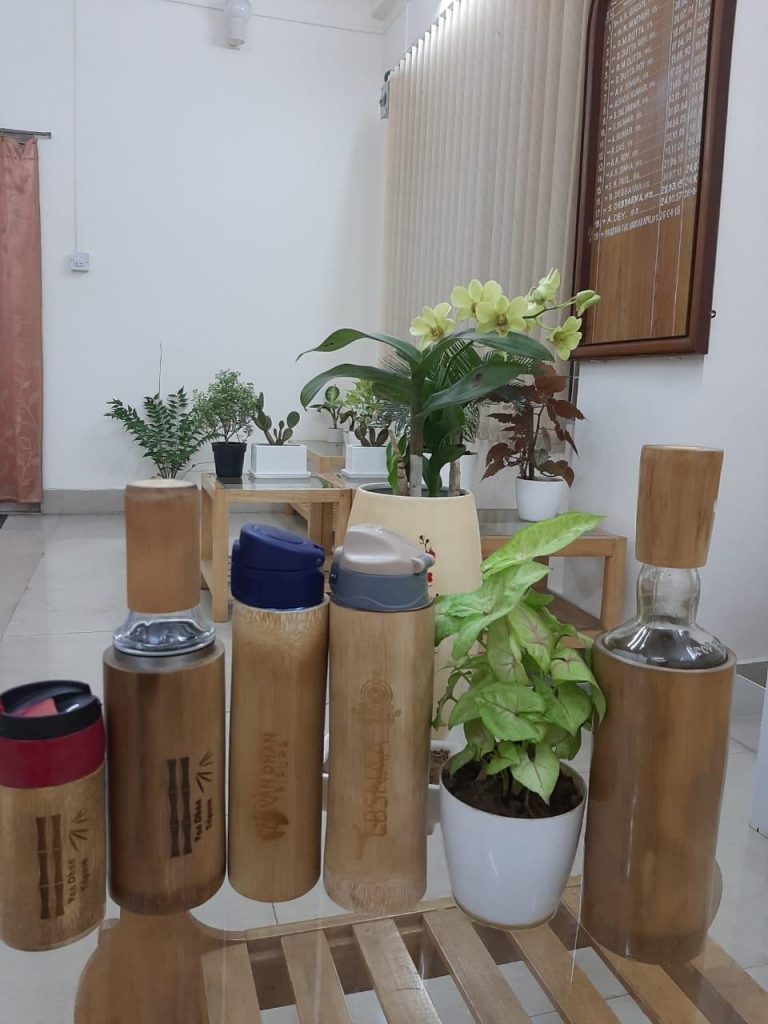IFS Officer’s Leak-Proof, Copper-Lined Bamboo Bottles are Great to Replace Plastic
- The best part? You could help families in Tripura earn a living when you purchase this plastic-free alternative. Find out how.
- Eight months ago, Indian Forest Services officer Prasada Rao undertook an initiative to help the tribal communities in Tripura use the locally-available resources to make value- added products in a bid to make them economically self-dependent.
- He chose to put his trust in bamboo.
- The northeastern state of Tripura grows 28 per cent of India’s annual bamboo yield. The green gold or poor man’s timber covers around 2397 sq. km of forest area which is 23 per cent of the geographical area of Tripura.
- Using this abundant resource, he provided training to 1,000 artisans in making bamboo handles for brooms. These brooms are not only cheaper but also environmentally friendly as they eliminate the use of plastic.
- Riding on the success of the bamboo broom handles, Prasada launched another initiative six months ago where he began training artisan families to manufacture bamboo bottles.
- IFS Officer Prasada Rao In a conversation with The Better India, Prasada Rao says, “For almost three to four months we have been immersed in the research and development of this product. We wanted to create something that not just looks good but is of international standards.”
- This is being been done in collaboration with the Bamboo and Cane Development Institute (BCDI) and Forest Research Center of Livelihood Extension at Agartala.
The Multiple Uses of Bamboo
- The Bamboo bottles ready to be shipped. Currently posted as Managing Director, Tripura Rehabilitation Plantation Corporation Limited, Prasada Rao informs us that he began the programme by training ten master trainers. The trainers are in the process of training 1000 artisans under the Pradhan Mantri Van Dhan Yojana (PMVDVK) and National Bamboo Mission (NBM)schemes.
- “We use locally-available material for these bottles. I feel it is one of the biggest USPs of this product,” says Prasada Rao. He further explains that they source both the bamboo (the outer shell of the bottle) and the copper (inner lining) locally.
- One of the reasons why Prasad insisted on using copper lining was to prevent the fungus that commonly develops in bamboo bottles.
- The benefits of copper vessels to store drinking water are multifold.
- According to Bangalore-based nutritionist, Dr Anju Sood, “Copper has properties that help kill harmful bacteria and reduce inflammation within the stomach, making it a great remedy for ulcers, indigestion and infections. Copper also helps cleanse and detox your stomach, regulates the working of your liver and kidneys, and proper elimination of waste and ensures the absorption of nutrients from food.”
- With the COVID-19 outbreak, recent studies have shown that the virus lasted the least on copper (upto 4 hours) whereas it lasted up to 2-3 days on plastic. Yet another reason to shift to using copper, perhaps! A wide range of bamboo bottles.
- He further informs that these leak-proof bottles come in three different sizes –300ml, 500 ml, 750 ml and 1000 ml. The cost starts from Rs 700 and goes upto Rs 1200, excluding tax and shipping charges.
- “We are also manufacturing flasks which will cost around Rs 1300 for 750 ml. These products are all handcrafted and I am happy that it has become a source of income for the tribals who work on it,” adds Prasada Rao.
- Talking about one of the first orders he received he says, “It was from the Lal Bahadur Shastri National Academy of Administration, Mussorie. We have sent them samples and if satisfied they are likely to place an order for 600 bottles.”
Benefits to the Artisans
- Meet Shibu – the artist behind the bamboo bottles.
- Shiva Prasad Datta (Shibu) (40) an artisan who has been working on making bamboo products since he can remember says, “While we have made bamboo bottles earlier, they were not durable and often after a few uses get filled with fungus. So we discontinued making them.”
- Shibu and his team then attended the training programme organised by Prasada Rao. When asked how much they earn per bottle, he says, “With the lockdown things have been slow but even then we are earning almost Rs 350 per bottle and with the number of orders increasing we are hopeful of earning more.”
- This amount is only the making charge, and each artisan is also paid for the procurement of the materials, explains Prasada Rao.


